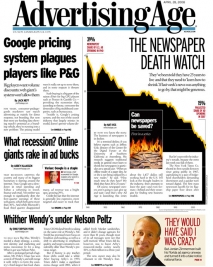
Advertising Age ran a piece this week called Newspaper Death Watch. I find it quite ironic that it appeared in the print version, but the content of this article amuses me even more. It’s true that the industry is getting its collective ass kicked by internet news, RSS, mobile phone content and other factors–ad revenues are down across the board and the revenues companies find online aren’t as satisfying as the rates for a print ad in WSJ at its peak.
A look beyond the headline of this Ad Age piece reveals a practice I have loathed from the beginning of my days as a writer–the desperately sensational headline which is directly contradicted by the content of the article. For starters, the Ad Age piece quotes Jeffrey Cole, director of the Center for the Digital Future at the University of Southern California at Annenberg, who predicts the industry has twenty years left in it. Hardly a rallying call to throw in the towel. While there’s a major market correction going on in the print world, it is by no means time to call in the newsprint version of Doctor Kervorkian just yet.Then the article goes on to say that some major players including Sam Zell see a bright future in print for those who know how to compete. I tend to agree–I don’t think that print is dead, not by a long shot. But why do I feel this way?
Simply put, as long as people are forced to sit in airport lounges, waiting rooms and subways, we will ALWAYS need print journalism. Until you can replace the convenience of grabbing a newspaper and leafing through it while waiting for your morning coffee or a root canal, some newspapers will always be there for just that purpose.
The weak ones (like Chicago’s infamously crappy Red Eye, which seems to be 90% AP Newswire and 10% inane nonsense) will go away as ad dollars get harder to come by. The quality publications that emphasize quality (like the weekly Chicago Reader) will continue to find businesses willing to spend money on ad inches because the people who control the purse strings themselves read that paper.
For us freelancers, it means times are getting much tougher in print, as I firmly believe the magazine industry needs–and will soon get–a similar market correction. You can already see it happening in specialty markets like music journalism. Rolling Stone ad sales are seriously down, and strong niche-based contenders like the alt-country No Depression have already been forced to fold up shop (albeit with plans to go online). The number of available gigs is going to shrink.
The real question is…can your writing compete?
